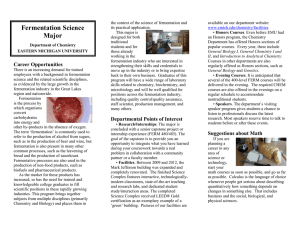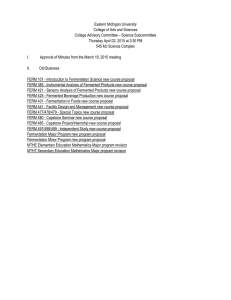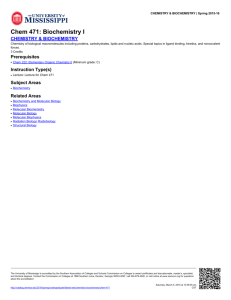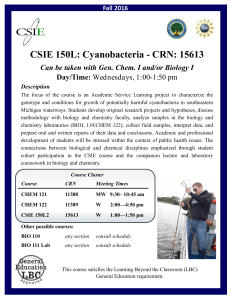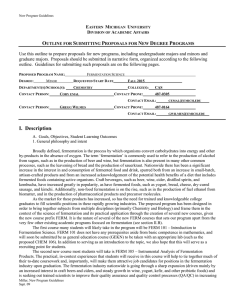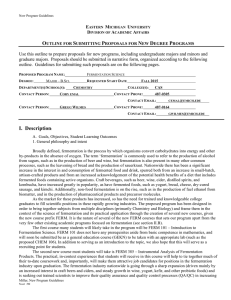Fermentation Science
advertisement
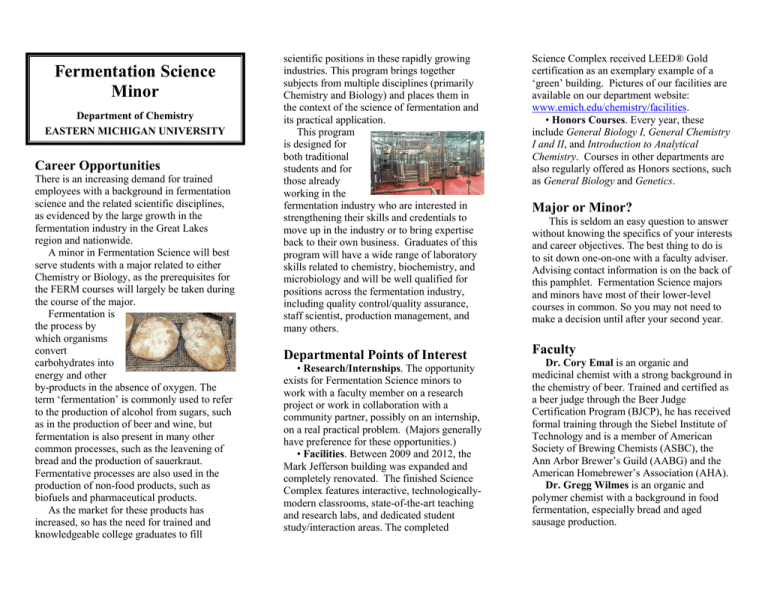
Fermentation Science Minor Department of Chemistry EASTERN MICHIGAN UNIVERSITY Career Opportunities There is an increasing demand for trained employees with a background in fermentation science and the related scientific disciplines, as evidenced by the large growth in the fermentation industry in the Great Lakes region and nationwide. A minor in Fermentation Science will best serve students with a major related to either Chemistry or Biology, as the prerequisites for the FERM courses will largely be taken during the course of the major. Fermentation is the process by which organisms convert carbohydrates into energy and other by-products in the absence of oxygen. The term ‘fermentation’ is commonly used to refer to the production of alcohol from sugars, such as in the production of beer and wine, but fermentation is also present in many other common processes, such as the leavening of bread and the production of sauerkraut. Fermentative processes are also used in the production of non-food products, such as biofuels and pharmaceutical products. As the market for these products has increased, so has the need for trained and knowledgeable college graduates to fill scientific positions in these rapidly growing industries. This program brings together subjects from multiple disciplines (primarily Chemistry and Biology) and places them in the context of the science of fermentation and its practical application. This program is designed for both traditional students and for those already working in the fermentation industry who are interested in strengthening their skills and credentials to move up in the industry or to bring expertise back to their own business. Graduates of this program will have a wide range of laboratory skills related to chemistry, biochemistry, and microbiology and will be well qualified for positions across the fermentation industry, including quality control/quality assurance, staff scientist, production management, and many others. Departmental Points of Interest • Research/Internships. The opportunity exists for Fermentation Science minors to work with a faculty member on a research project or work in collaboration with a community partner, possibly on an internship, on a real practical problem. (Majors generally have preference for these opportunities.) • Facilities. Between 2009 and 2012, the Mark Jefferson building was expanded and completely renovated. The finished Science Complex features interactive, technologicallymodern classrooms, state-of-the-art teaching and research labs, and dedicated student study/interaction areas. The completed Science Complex received LEED® Gold certification as an exemplary example of a ‘green’ building. Pictures of our facilities are available on our department website: www.emich.edu/chemistry/facilities. • Honors Courses. Every year, these include General Biology I, General Chemistry I and II, and Introduction to Analytical Chemistry. Courses in other departments are also regularly offered as Honors sections, such as General Biology and Genetics. Major or Minor? This is seldom an easy question to answer without knowing the specifics of your interests and career objectives. The best thing to do is to sit down one-on-one with a faculty adviser. Advising contact information is on the back of this pamphlet. Fermentation Science majors and minors have most of their lower-level courses in common. So you may not need to make a decision until after your second year. Faculty Dr. Cory Emal is an organic and medicinal chemist with a strong background in the chemistry of beer. Trained and certified as a beer judge through the Beer Judge Certification Program (BJCP), he has received formal training through the Siebel Institute of Technology and is a member of American Society of Brewing Chemists (ASBC), the Ann Arbor Brewer’s Guild (AABG) and the American Homebrewer’s Association (AHA). Dr. Gregg Wilmes is an organic and polymer chemist with a background in food fermentation, especially bread and aged sausage production. Required Courses for the Minor: Some of the requirements for a minor in Fermentation Science depend upon the specific major. Required for ALL minors: 1. FERM 101 (3) Intro to Fermentation Science 2. Choose four credit hours from the following: FERM 421 (2) Sensory Analysis of Fermented Products FERM 425 (2) Fermented Beverage Production FERM 431 (2) Fermentation in Foods FERM 441 (2) Facility Design and Management FERM 477 (1) Special Topics FERM 478 (2) Special Topics FERM 479 (3) Special Topics 3. Specific Required Courses depending upon your major, see below. 4. Enough hours of restricted electives to total at least 20 credits in the minor. A minimum of 3 hours of restricted electives must be completed. See the list of restricted electives on the next page. Requirements1 for Biology Majors: FERM 385 (3) Analysis of Fermented Products2 CHEM 281 (4) Analytical Chemistry BIO 305 (3) Cell and Molecular Biology BIO 425 (5) Microbiology One course from the following: CHEM 351 (4) Foundations of Biochemistry CHEM 451 (3) Biochemistry I Requirements1 for Biochemistry Majors: FERM 385 (3) Analysis of Fermented Products2 BIO 305 (3) Cell and Molecular Biology BIO 425 (5) Microbiology Requirements1 for Chemistry Majors: Other Departmental Programs: BIO 110 (3) Introductory Biology I BIO 111 (2) Introductory Biology I Laboratory *BIO 301 (3) Genetics (*Completion of BIO 110/111 is required to obtain Biology department permission for BIO 301.) BIO 305 (3) Cell and Molecular Biology BIO 425 (5) Microbiology One course from the following: CHEM 351 (4) Foundations of Biochemistry CHEM 451 (3) Biochemistry I Professional Biochemistry: This program prepares students for graduate study or a research career in biochemistry, particularly the pharmaceutical industry. It is often selected by students in pre-medical and pre-dental programs. General Biochemistry: This major prepares students for entry level technical positions in biochemistry, particularly in the pharmaceutical industry. It is often selected by students in pre-medical, pre-dental and pre-pharmacy programs. Professional Chemistry: This program, which meets American Chemical Society requirements, prepares students for careers as professional chemists. Graduates are prepared to enter technical positions in industry and governmental research, or to undertake graduate study in chemistry. General Chemistry: This major prepares students for entry level technical positions in the chemical industry and related careers in business, patent law, technical writing, or industrial health and safety. It may also be selected by students for careers in secondary education or health fields, such as medicine, dentistry and pharmacy. Restricted Electives for ALL Majors: Any FERM course not elected above FERM 497 (1) Independent Study FERM 498 (2) Independent Study FERM 499 (3) Independent Study HRM 103 (3) Intro to the Hospitality Industry HRM 150 (2) Sanitation in the Hospitality Industry HRM 180 (3) Food Production HRM 251 (3) Meal Service Management HRM 340 (3) Cost Controls in the Hospitality Industry HRM 376 (3) Legal Aspects of the Hospitality Industry HRM 470 (3) Hospitality Industry Marketing HRM 485 (3) Beverage Management ACC 240 (3) Principles of Financial Accounting MET 314 (3) Applied Thermodynamics and Heat Transfer Other courses with approval of program coordinator Want to learn more? For more information contact: 734.487.0106 1 If you take any of the required courses as part of your major, you are not required to substitute for them to complete your minor. However, they do not count towards the minimum of 20 credit hours required for the minor and you must complete enough restricted electives to reach this minimum. 2 CHEM 381W or 481 may substitute for FERM 385 with permission from the program coordinator. E-mail: Dr. Cory Emal cemal@emich.edu Dr. Gregg Wilmes gwilmes@emich.edu Visit us on the Web: www.emich.edu/chem istry/fermsci 2-05-16
